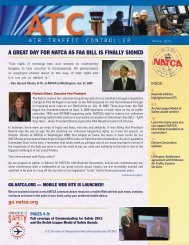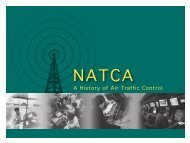Against the Wind - National Air Traffic Controllers Association
Against the Wind - National Air Traffic Controllers Association
Against the Wind - National Air Traffic Controllers Association
Create successful ePaper yourself
Turn your PDF publications into a flip-book with our unique Google optimized e-Paper software.
198<br />
1999<br />
<strong>Against</strong> <strong>the</strong> <strong>Wind</strong><br />
10<br />
<strong>the</strong> MEBA loan until October 1995, it was no longer<br />
spending in <strong>the</strong> red. But its annual income of about $7<br />
million was stretched to <strong>the</strong> limit. Arbitrations were<br />
piling up, asbestos issues loomed, negotiating <strong>the</strong><br />
1993 contract would cost<br />
about $1 million, and <strong>the</strong><br />
union was outgrowing its<br />
cramped space at MEBA<br />
headquarters.<br />
NATCA publicized<br />
<strong>the</strong> need for raising dues<br />
before <strong>the</strong> convention.<br />
But nearly half of <strong>the</strong><br />
controllers back home<br />
sent <strong>the</strong>ir delegates to<br />
San Antonio with firm<br />
instructions to oppose<br />
any increase. “We were<br />
against it for <strong>the</strong> same<br />
reason we’re against taxes.<br />
It wasn’t clear enough<br />
what we were going to do<br />
with <strong>the</strong> money,” says Bill Otto, facility rep at St. Louis<br />
Tower and TRACON at <strong>the</strong> time. The issue became<br />
<strong>the</strong> talk of <strong>the</strong> convention in hotel bars and elevators,<br />
at Dick’s Last Resort along San Antonio’s famed River<br />
Walk, everywhere.<br />
Aside from membership sentiment, <strong>the</strong>re<br />
were several procedural obstacles. At <strong>the</strong> Las Vegas<br />
May July<br />
convention in 1990, when delegates first rejected an<br />
increase, <strong>the</strong>y approved Karl Grundmann’s constitutional<br />
amendment requiring a vote of <strong>the</strong> entire<br />
membership to change <strong>the</strong> dues structure. And<br />
standing convention<br />
rules stipulated that all<br />
adopted decisions took<br />
effect at <strong>the</strong> close of <strong>the</strong><br />
“<br />
convention. Both had to<br />
be changed before <strong>the</strong><br />
delegates could even consider<br />
raising dues.<br />
President Krasner<br />
always believed in an increase<br />
to enable NATCA<br />
“to grow as a union.”<br />
— Former President Barry Krasner He wanted to raise dues<br />
once and never change<br />
<strong>the</strong>m again—up or down.<br />
Deftly applying Robert’s<br />
Rules of Order and taking<br />
care to explain each step<br />
of <strong>the</strong> process to <strong>the</strong> delegates, Krasner first tackled<br />
<strong>the</strong> issue of modifying <strong>the</strong> standing convention rules<br />
so that amendments and resolutions would take effect<br />
immediately. This required a two-thirds majority.<br />
At virtually every convention, controllers seize<br />
on an issue <strong>the</strong>y believe demands a roll-call vote,<br />
known as a division of <strong>the</strong> house. In San Antonio,<br />
I can’t think of a prouder<br />
moment than to have a<br />
building named after you<br />
while you’re still alive. That<br />
was pretty darn cool.<br />
Nearly 300 participants attend “NATCA in Washington.” The union signs a purchase agreement with <strong>the</strong> American Society<br />
for Microbiology to buy its office building at 1325 Massachu-<br />
21<br />
setts Avenue NW in Washington, D.C., for $8.1 million.




